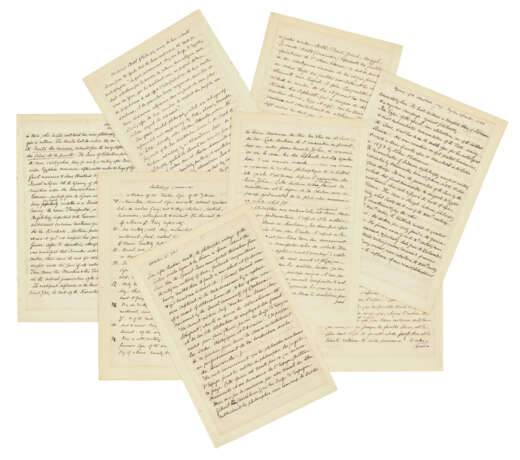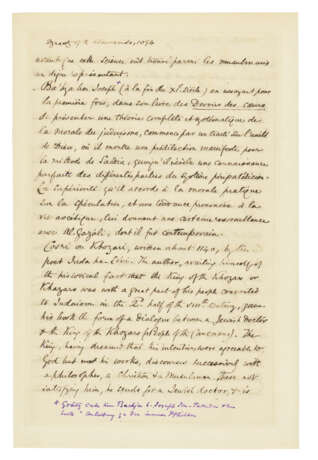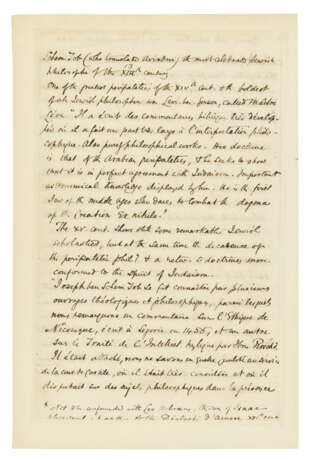ID 1449879
Lot 35 | George Eliot (pen name of Mary Ann Evans, 1819-1890)
Estimate value
£ 20 000 – 25 000
Autograph manuscript, 'Historical Sketch of Philosophy among the Jews', reading notes on Jewish philosophy and the theoretical Kabbalah, [c.1872]
In English and French. In black and occasionally purple ink, 16 pages on 8 leaves, 199 x 128mm, extracted from a notebook, window-mounted, later pencil foliation 55-62. Provenance: Charles Lee Lewes (1842-1891) – his widow Gertrude Hill (1837-1923) – her posthumous sale of 'Books, Relics, Manuscripts and Portraits of "George Eliot"' at Sotheby's, 27 June 1923, lot 581; Sotheby's New York, 16 December 2022, lot 127.
Eliot's reading notes towards Daniel Deronda, comprising summaries and quotations of Salomon Munk's 'Esquisse historique de la Philosophie chez les Juifs' (published in his Mélanges de philosophie Juive et Arabe (1857-59)), the first work to survey Jewish philosophy in a scholarly manner. These notes show Eliot’s efforts to engage intellectually with the ideational substance and messianic aspirations of the novel’s main Jewish characters (reflected in particular in the character of the visionary Mordecai and the structure of his relationship with Daniel). Beginning 'It was from the Greeks that the Jews contracted the taste for Metaphysics', and following (with particular interest in the Essenes) the development of 'graeco-orientalist philosophy' among the Jews in the centuries BCE, Eliot notes the influence of Islam and of Arabic philosophy amongst the Jews of Spain, culminating in the 'reconciliation of Judaism & philosophy ... first worthily undertaken by Maimonides', and concluding with six pages of notes concerning the theoretical Kabbalah.
One of the great novelists in English of the 19th century, Eliot is especially noted for developing the method of psychological realism which defines the modern novel. She has been called 'an intellectual novelist' – concerned more with 'the inner drama' than the external actions of her characters – and her analysis and depiction of characters would typically be based on extensive reading into the ideologies which motivated them. Eliot herself had a lifelong interest in philosophy – she translated Spinoza’s Ethics into English before becoming a novelist – and her novels are recognized and celebrated as platforms for the exploration of ethical and moral issues.
Eliot recorded in her diary for 1 January 1868 that she was reading Munk's Mélanges de philosophie Juive et Arabe, but the notes from Arnould's Histoire de l'Inquisition (1869) on the first page of this extract indicate that this manuscript dates from a few years later – most likely around 1872, when having completed Middlemarch Eliot embarked seriously on her reading for Daniel Deronda; this was also the year in which she switched from black to purple ink (this manuscript is primarily in black, but with minor revisions and notes in purple). Preceding leaves from the same notebook (similarly mounted, comprising ff.37-39, 45 and 51-54), primarily concerning the Jews during the Spanish Inquisition, were sold at Christie's New York, 9 December 1998, lot 19 ($6,325). These notes are discussed in Nurbhai and Newton's 2002 study 'George Eliot, Judaism and the Novels' (which argues that Jewish philosophy and mysticism influenced all of Eliot’s novels, and not only Daniel Deronda). Manuscripts by George Eliot are very rare at auction: Rare Book Hub records no other examples in the last 20 years.
| Place of origin: | England, Northern Europe, Europe, United Kingdom |
|---|---|
| Auction house category: | Letters, documents and manuscripts, Books and manuscripts |
| Place of origin: | England, Northern Europe, Europe, United Kingdom |
|---|---|
| Auction house category: | Letters, documents and manuscripts, Books and manuscripts |
| Address of auction |
CHRISTIE'S 8 King Street, St. James's SW1Y 6QT London United Kingdom | |
|---|---|---|
| Preview |
| |
| Phone | +44 (0)20 7839 9060 | |
| Buyer Premium | see on Website | |
| Conditions of purchase | Conditions of purchase |





